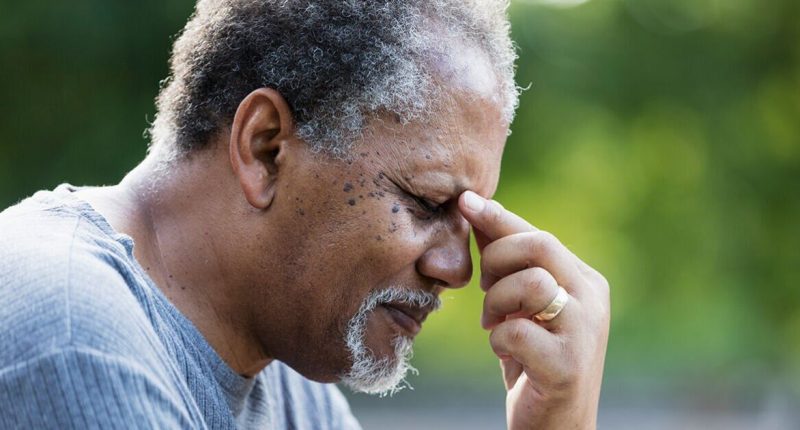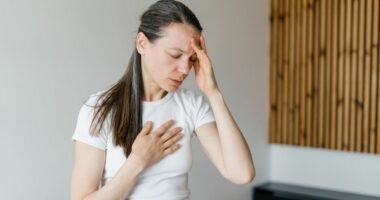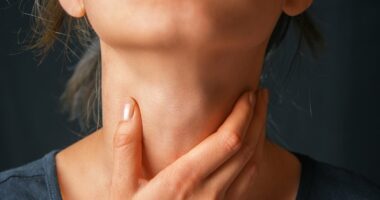Share this @internewscast.com
The NHS has urged people to “call 999 now” if a certain symptom does not improve after 30 minutes. Brits are at risk of this health issue amid a warning for high temperatures.
According to the health body, you should contact the emergency services if someone is experiencing signs of heatstroke “after 30 minutes of resting in a cool place, being cooled and drinking fluids”. Heatstroke can occur in extreme temperatures and is more common in children, older people and people with long-term health conditions.
On its website, the NHS said: “Heat exhaustion does not usually need emergency medical help if you can cool down within 30 minutes. If it turns into heatstroke, it needs to be treated as an emergency.”
It added: “Call 999 now if you or someone else have signs of heatstroke, including still [being] unwell after 30 minutes of resting in a cool place, being cooled and drinking fluids.”
This week, the UK Health Security Agency (UKHSA) warned that a yellow heat alert for parts of England could be dangerous. This comes as the Met Office has predicted temperatures of up to 30C.
Worst affected areas include the east of England, east Midlands, London and south east regions. On its website, the UKHSA said: “Whilst temperatures may not seem too high for the general population for now, data from UKHSA shows that even at these forecasted temperatures, vulnerable groups and health care services can be impacted.”
Under UKHSA and the Met Office’s Weather-Health alerting system, a yellow alert means that any impacts will likely include:
Dr Agostinho Sousa, head of extreme events and health protection at UKHSA, explained: “Our findings show that even moderate heat can result in serious health outcomes, especially for older adults, and it is therefore important that everyone takes sensible precautions while enjoying the sun. The forecasted high temperatures are expected to be short-lived but could primarily impact those over the age of 65 or those with pre-existing health conditions.
Find out about the symptoms you need to watch out for and get health advice with our free health newsletter from the Daily Express
“If you have friends, family or neighbours who are more vulnerable, it is important to check in on them and ensure they are aware of the forecasts and are following the necessary advice.’’
Symptoms of heatstroke
The NHS states that heat exhaustion does not usually need emergency medical help if you can cool down within 30 minutes. But if it turns into heatstroke, it needs to be treated as an emergency.
The signs of heat exhaustion include:
- Tiredness
- Dizziness
- Headache
- Feeling sick or being sick
- Excessive sweating and skin becoming pale and clammy or getting a heat rash, but a change in skin colour can be harder to see on brown and black skin
- Cramps in the arms, legs and stomach
- Fast breathing or heartbeat
- A high temperature
- Being very thirsty
- Weakness.
You should call 999 if you or someone else has signs of heatstroke, including:
- Still being unwell after 30 minutes of resting in a cool place, being cooled and drinking fluids
- A very high temperature
- Hot skin that’s not sweating and might look red (this can be harder to see on brown and black skin)
- A fast heartbeat
- Fast breathing or shortness of breath
- Confusion and lack of coordination
- A seizure or fit
- Loss of consciousness.
The yellow heat-health alert is in place until Sunday.
If someone has heat exhaustion you should:
- Move them to a cool place
- Remove all unnecessary clothing like a jacket or socks
- Get them to drink a sports or rehydration drink, or cool water
- Cool their skin – spray or sponge them with cool water and fan them. Cold packs, wrapped in a cloth and put under the armpits or on the neck are good too.
How to stay safe
To stay safe during this hot weather event, the UKHSA advised people to keep out of the sun at the “hottest time of the day”, which is between 11am and 3pm. It also recommended:
- Keeping your home cool by closing windows and curtains in rooms that face the sun
- If you do go outside, cover up with suitable clothing, such as an appropriate hat and sunglasses, and seek shade and apply sunscreen regularly
- If you are going to do a physical activity (for example, exercising or walking the dog), plan to do these during times of the day when it is cooler, such as the morning or evening
- Knowing the symptoms of heat exhaustion and heatstroke and what to do if you or someone else has them.















